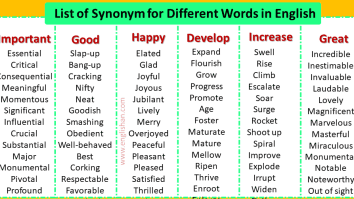
Synonyms, though one of the most interesting aspects of the English language, remain somewhat mysterious. It’s astounding how even the slightest nuances in meaning can change a phrase or thought completely – so what is it that makes synonyms so prodigious and why are they so important for writers? This article seeks to answer these questions and explore the fascinating world of comparably synonym .
What Are Synonyms?
A synonym is simply a word or phrase which has the same or nearly the same meaning as another. They are often used to expand or diversify the range of words a writer has access to in order to give their writing more variety or clarity. For example, ‘start’ and ‘commence’ have similar meanings but can be used when writing to offer more options to the reader.

The Benefits of Using Synonyms
Using synonyms is advantageous as it gives any written piece a more sophisticated feel. Replacing commonly used words with ones less frequently used means readers gain a clearer understanding of what is trying to be conveyed. Additionally, using synonyms ensures writing does not become monotonous: although this might seem insignificant, reading writing which lacks variation is incredibly boring!
Synonyms are also useful for writing concisely. By replacing long phrases or sentences with a single yet meaningful word, extra information can be included without taking up too much space; this may be essential when trying to keep within a word count.
How Synonyms Can Aid Understanding
As mentioned previously, using synonyms can help make the meaning of a piece of writing clearer. Subtle differences in meaning between two words can vastly improve the comprehension of the reader due to the fact they are presented with two slightly different interpretations of the same thought.
An example of this could be when discussing wealth. The use of ‘well-off’ and ‘rich’ could show the difference between someone who has a good standard of living and someone who is considered to be excessively wealthy. Therefore, through the use of alternate words, the intention of the writer can be felt more clearly.
Where Do Synonyms Come From?
Synonyms can come from many places and usually develop over time. Variations on words or idioms can come from a variety of sources such as dialects of languages, regional accents, slang etc. An example of this is the differences between British and American English: although they don’t vary hugely, there are still noticeable changes such as what colour Americans call ‘eggplant’ versus ‘aubergine’ used by the British.
Common Issues With Synonyms
Care needs to be taken when picking a synonym to ensure the intended meaning is not lost. Although it can be tempting to replace commonly used words with alternate ones, these should be used with caution. For instance, if writing about financial aid, ‘subsidise’ would be a better option than ‘support’, whereas the latter might work better for providing emotional assistance.
Similarly, an issue with synonyms is the usage of informal terms can be seen as unprofessional. When further clarifying a point with a synonymous phrase, take into consideration whether it is appropriate for the context. In an academic essay, it might be wise to stick to words found in an official dictionary as opposed to using humorous or colloquial ones.
Conclusion
In conclusion, the use of synonyms is beneficial to writers as it allows them to convey the same message in an alternate way, thus improving the overall impression made on a reader. As mentioned, care must be taken to ensure they are suitable for the text at hand, however once mastered, synonyms offer writers an opportunity to add depth to their writing while enhancing its comprehensibility.
